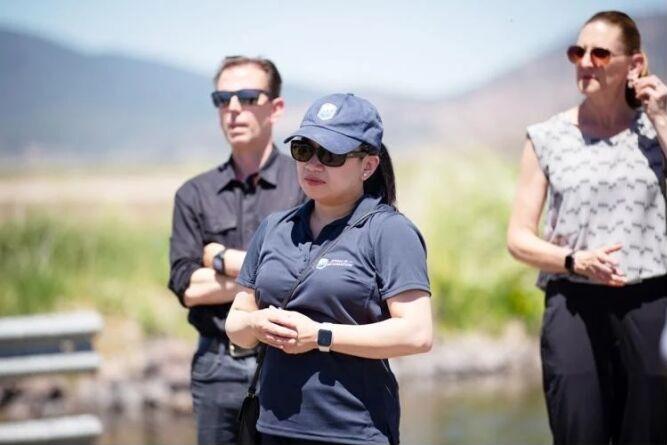https://www.heraldandnews.com/klamath/a-conversation-with-bureau-of-reclamation-commissioner-camille-touton-about-the-klamath-basin/article_30bbff0e-71e9-53b0-bf1f-0f1559aabd94.html
 Managing
Water, Reclamation Commissioner Camille Touton visits
Klamath Basin Managing
Water, Reclamation Commissioner Camille Touton visits
Klamath Basin
Last
week, U.S. Bureau of Reclamation Commissioner Camille Touton,
who leads the federal agency that oversees water management
in 17 Western states, traveled through Oregon and
California, visiting projects and meeting with concerned
communities.
Touton started her week in the Klamath Basin and ended it
near the California-Mexico border. Thursday, she sat down
for an exclusive virtual interview with the Capital Press.
The conversation centered on a major theme: The West likely
isn’t getting any more water, so what is Reclamation’s plan
for better managing the water the region does get?
Klamath Basin
The Klamath Basin, straddling Oregon and California, is a
center of conflict where farmers and ranchers compete with
tribes and fish managers for scarce water during the ongoing
drought.
Reclamation manages the Klamath Project under its interim
operations plan, a formula that determines how much water to
allocate to irrigators versus other uses. The plan is a
stand-in until Biological Opinions dictating project
operations are updated, which happens about every five
years. Critics say the timeline makes the plan unworkable.
The current interim plan is set to expire Sept. 30. Many
farmers, ranchers and tribal members are urging Reclamation
not to extend the interim operations plan and instead to do
annual consultations to determine allocations, which they
say would be more flexible and based on current conditions.
Touton was asked if she will consider granting this request.
The commissioner declined to give a definite yes or no, but
she didn’t rule out the option.
“I would just say we’re having a conversation on a lot of
fronts, including, you know, what a year operation (annual
consultations) would look like,” said Touton.
Asked whether she sees the Klamath Project as sustainable
with its current model and scale, Touton said, “I don’t want
to speculate on that.”
So, what is Touton’s game plan for the Klamath Basin? The
commissioner said which tools her agency uses in the basin
will depend on which tools local partners — including
irrigation districts and tribes — welcome.
She said potential tools, funded in part by the bipartisan
infrastructure act Congress passed last year, could include
repairs to aging infrastructure, conservation efficiencies
and new piping.
Modernization
Some irrigation districts are interested in modernizing
their systems, including replacing open canals with
high-density polyethylene piping, which loses less water to
evaporation.
Touton was asked if she supports piping and similar
modernization. Her answer was yes, but she added the caveat
that what’s right for a particular community or geographic
region varies and is not solely Reclamation’s decision.
“Some tools that work in the Klamath won’t work in Yakima or
won’t work for the Imperial Valley,” Touton said. “That’s
why I’m traversing (the West), to just really firsthand see
what our partners are seeing, listen to them and then use
the tools (Reclamation has) to say, ‘This is what’s right
for you.’ You want to pressurize? Great. Let’s use this
program that I have. … It’s really a conversation about what
works for them, not Reclamation just saying, ‘This is what
we’re going to do.’”
Storage projects
In the past 18 months, Reclamation has invested hundreds of
millions of dollars in new water storage across the West —
for example, by raising dams.
Some regions, however, have no new storage projects on the
horizon. For example, Oregon doesn’t have any storage
projects planned with Reclamation. Touton was asked why not.
“I think it goes back to what we talked about: what makes
sense for what community and what they want,” Touton said.
Reclamation’s recent storage investments, she said, have
largely been in California, where she said partners are
prioritizing storage as a need.
Touton said she plans to continue touring the West to better
understand which tools and infrastructure best suit specific
communities.
====================================================
In accordance with Title 17 U.S.C.
section 107, any copyrighted material
herein is distributed without profit or
payment to those who have expressed a
prior interest in receiving this
information for non-profit research and
educational purposes only. For more
information go to:
http://www.law.cornell.edu/uscode/17/107.shtml |

